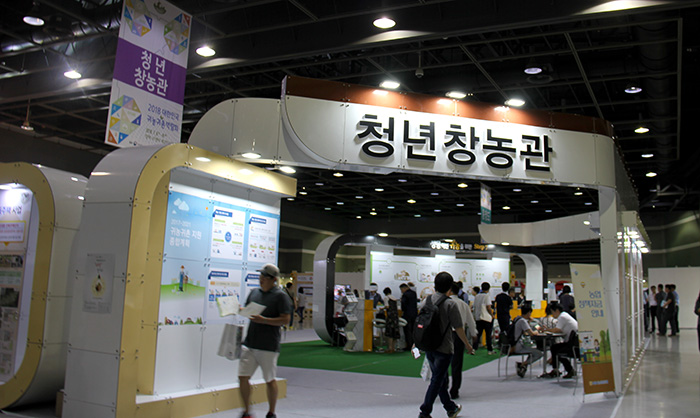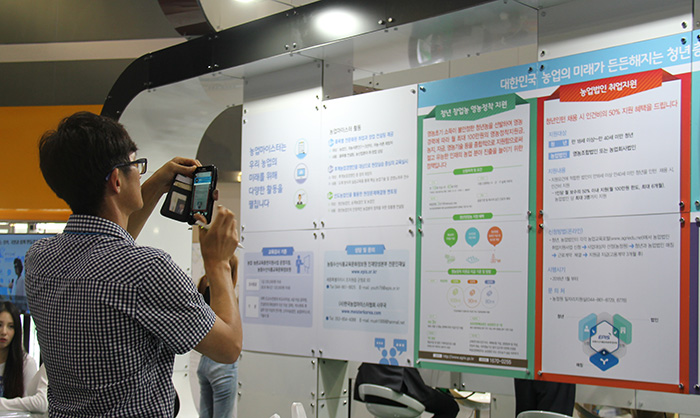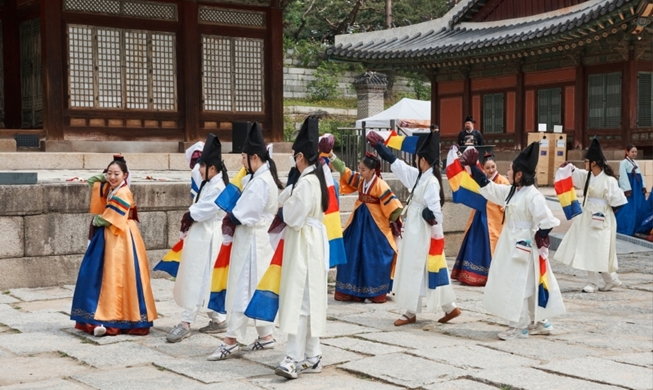-
 Korea.net's 24-hour YouTube channel
Korea.net's 24-hour YouTube channel- NEWS FOCUS
- ABOUT KOREA
- EVENTS
- RESOURCES
- GOVERNMENT
- ABOUT US
View this article in another language
- 한국어
- English
- 日本語
- 中文
- العربية
- Español
- Français
- Deutsch
- Pусский
- Tiếng Việt
- Indonesian
A researcher from the Rural Development Administration inspects a new breed of strawberry in Hongseong County, Chungcheongnam-do Province, in December 2017. (Rural Development Administration)
By Hahm Hee-eun
In the early 20th century during a phase of rapid industrialization, many people in Korea moved to the city for better opportunities to earn money or to gain fame. As a result, around 10 million people reside not only in Seoul proper, but about half of the entire population of the country is concentrated on the greater capital area in and around Seoul.
Recently, however, advance in technology and communications have created an environment where physical distance is no longer such a barrier, and thus, professional dreams can now be fulfilled in rural areas, too. In addition, Postmodernism, which attempts to escape from a city-centered mind and to restore the oppressed desires and values of a rural life, has developed as a social trend that brings people back to the countryside to farm.
According to a report from Statistics Korea and the Ministry of Agriculture, Food and Rural Affairs that was released on July 3, the number of people moving to the countryside increased by 20,769, bringing the total to 516,817. This is the first time the numbers surpassed 500,000, since the agencies started to collect the statistics in 2013. More than half of these people are young, under 40-years-old, and with a family. This shows that the age of people deciding to leave the city to engage in agriculture is gradually becoming younger.
Why are young farmers increasing in number?
Moving to a rural area not only fulfills a desire to live in serenity and natural attractions, but also opens new doors to high potential businesses that combine information and communications technology (ICT) with agriculture, creating what are called “smart farms.” Besides this, the fairy tale side of living in the countryside has been highlighted by social media broafcasts on YouTube and Instagram.
In reality, however, there are several cases where people fail to overcome the difficulties of farming and living in the countryside. According to a 2016 survey by the Ministry of Agriculture, Food and Rural Affairs, major reasons for giving up on countryside life were, first, a lack of income, which consisted 37.8 percent of the answers, and, second, the difficulty of farming, which consisted 18 percent of the answers. Thus, critics have asserted that a systematic agricultural education and government subsidies are required for young farmers.

Counseling services about farming and moving to the countryside are targeted at young people, during the 17th Return Farm & Edutainment Expo 2018 held in Yangjae-dong, Seoul, on July 6. (Hahm Hee-eun)
Consequently, the government has been launching various policies to minimize difficulties in farming and in moving to the countryside.
The Ministry of Agriculture, Food and Rural Affairs currently selects 1,600 people under the age of 40 to provide them with up to KRW 1 million per month for up to three years so that young farmers in agriculture can adapt and stabilize their agricultural income.
As for the Rural Development Administration, it supports professional training courses for field agricultural machinery. Last year, courses on ICT-based automation of agricultural machinery received much attention among young people. Through the field curriculum, farmers can acquire expertise on new technology for agricultural machinery without much of an economic burden.

A participant takes a photograph of a notice board that introduces policies for young farmers, at the 17th Return Farm & Edutainment Expo 2018 held at the aT Center in Yangjae-dong, Seoul, on July 6. (Hahm Hee-eun)
Yoo Jae-eun, a young farmer currently cultivating bok choy and taking a Farm Share training program, said, "I used to work as a white-collar employee before, but I have always wanted to follow the plow. At first, I was worried that I wouldn’t be able to make a regular income. However, starting this year, agricultural education and other various supports are provided by the government, and I feel like my dream of farming is finally coming true."
Compared to other occupations, agricultural work in Korea hasn’t received much recognition. Nonetheless, global investment expert Jim Rogers and futurist scholar Thomas Frey have forecasted that agriculture is to become the most promising industry. Currently, young people’s farming trends are at the beginning stages, which means that there will be trials and errors. However, it is expected that once this stage is cleared, agriculture will gradually become a new alternative for young people to fulfill their dreams.
hehahm@korea.kr













